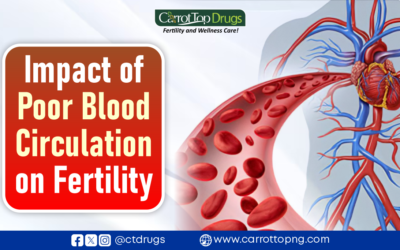Introduction
Irregular menses is a condition whereby the menstrual cycle is affected. It is when it comes earlier or later than it ought to come. In the previous article, we have examined the most prominent causes. In this article, however, we are going to reveal to you the symptoms and the treatment options available.
Symptoms of Irregular Menses
In this section, you would know the symptoms that point to irregular menses. They include
Changes in Menstrual Flow
Changes in menstrual flow can be a common symptom of irregular menses. Women may experience variations in the length of their menstrual cycle, the amount of bleeding, and the duration of bleeding. These changes can be caused by a variety of factors. They include hormonal imbalances, stress, weight fluctuations, and underlying health conditions.
A change in menstrual flow implies that a woman may experience heavier bleeding than usual. She may notice that her periods are lasting longer than normal. Alternatively, she may experience lighter bleeding or periods that are shorter than usual.
It’s important to note that irregular menses can be a symptom of an underlying health condition, such as Polycystic Ovary Syndrome (PCOS), thyroid disorders, or other hormonal imbalances. These conditions can affect the menstrual cycle and cause irregular bleeding patterns.
In some cases, irregular menses may be a temporary condition that resolves on its own. However, for many women, managing irregular menses may be an ongoing process that requires ongoing attention and care.
If a woman experiences changes in menstrual flow that are outside of what is considered normal for her, she should speak with her healthcare provider.
Changes in Cycle Length
Changes in cycle length can be a symptom of irregular menses. This refers to menstrual cycles that occur outside of the normal range of 21 to 35 days. Irregular menses can cause a woman’s menstrual cycle to become shorter or longer than usual. It can also cause periods to become heavier or lighter.
One of the most common changes in cycle length that women with irregular menses experience is a variation in the number of days between their periods. For example, a woman may have a 28-day cycle for one month. It is then followed by a 35-day cycle in the next. In some cases, women may experience a completely unpredictable cycle length. This makes it difficult to anticipate when their next period will occur.
Changes in cycle length can be caused by a number of factors. They include hormonal imbalances, stress, changes in weight, and certain medical conditions such as polycystic ovary syndrome (PCOS). If a woman experiences irregular menses and changes in cycle length, it is important to consult with a healthcare provider to determine the underlying cause and develop an appropriate treatment plan.
Missed periods
Missed periods can be a common symptom of irregular menses. When a woman’s menstrual cycle is irregular, she may experience missed periods. In other situations, periods may occur more frequently than usual.
Missed periods can be caused by a number of factors associated with irregular menses. Some of them are hormonal imbalances, stress, changes in weight, and certain medical conditions such as polycystic ovary syndrome (PCOS). In some cases, missed periods may be a sign of pregnancy or menopause. Although, these conditions are not typically associated with irregular menses.
If a woman experiences missed periods and irregular menses, it is important to consult with a healthcare provider to determine the underlying cause and develop an appropriate treatment plan.
Diagnosis of Irregular Menses
Now that we have been able to check out the most common symptoms, let’s move forward. In this section, we would discuss how irregular menses is diagnosed.
Medical history and physical examination
The first thing a physician would get from you is a medical history. This is then followed by a physical examination. Medical history and physical examination are important diagnostic tools for identifying the underlying causes of irregular menses.
During a medical history evaluation, a healthcare provider will ask questions about the patient’s menstrual history. These questions may revolve around the regularity of their cycles and any changes or abnormalities that they have experienced. The provider may also ask about the patient’s medical history. They include any medications they are taking or medical conditions they have been diagnosed with. The doctor would also ask for a family history of menstrual irregularities or other reproductive disorders.
A physical examination may also be performed to assess the patient’s reproductive health. It can identify any physical abnormalities that may be contributing to irregular menses. This may include a pelvic exam to assess the size, shape, and position of the uterus and ovaries, as well as a breast exam to check for any lumps or other abnormalities.
Additional diagnostic tests may also be recommended, such as blood tests to evaluate hormone levels or imaging tests such as ultrasound or MRI to assess the reproductive organs. In some cases, a biopsy or other specialized testing may be necessary to identify the underlying cause of irregular menstrual cycles.
Blood tests
Blood tests can be a useful diagnostic tool for identifying the underlying causes of irregular menses.
A blood test may be used to evaluate hormone levels, such as levels of follicle-stimulating hormone (FSH), luteinizing hormone (LH), estradiol, and progesterone. Hormonal imbalance is a common cause of irregular menses. Blood tests can help identify any abnormalities in hormone levels that may be contributing to this condition.
In addition to evaluating hormone levels, blood tests can also be used to check for other medical conditions that may be causing irregular menses. Some of such conditions are thyroid dysfunction, polycystic ovary syndrome (PCOS), or other hormonal disorders.
A healthcare provider may also use blood tests to monitor the patient’s response to treatment for irregular menses, such as hormone therapy or medication to regulate the menstrual cycle.
Imaging tests
Imaging tests can be an important diagnostic tool for identifying the underlying causes of irregular menses. Tests such as ultrasound or magnetic resonance imaging (MRI) can be used to assess the reproductive organs. It is used to identify any physical abnormalities that may be contributing to irregular menses. For example, an ultrasound can be used to evaluate the size and shape of the uterus and ovaries. It can as well as identify any cysts, fibroids, or other growths that may be affecting menstrual cycles.
An MRI may also be used to assess the reproductive organs and identify any structural abnormalities that may be contributing to irregular menses. This imaging test can provide detailed images of the uterus, ovaries, and other reproductive organs. It allows healthcare providers to evaluate the size, shape, and position of these structures.
Imaging tests may also be used to monitor the patient’s response to treatment for irregular menses, such as medication to regulate the menstrual cycle or surgery to remove growths or other physical abnormalities.
Complications of Irregular Menses
Infertility
Infertility can be a potential complication of irregular menses. Irregular menses can manifest in different ways, such as longer or shorter cycles, missed periods, or heavy bleeding.
One possible cause of irregular menses is polycystic ovary syndrome (PCOS), a hormonal disorder that can affect a woman’s fertility. Women with PCOS may experience irregular periods. Other symptoms like acne, weight gain, and excess hair growth may occur.
Irregular menses can also be caused by thyroid disorders, excessive exercise, stress, or changes in weight. These factors can disrupt the hormonal balance in a woman’s body. This can affect ovulation and the chances of conceiving.
If a woman is experiencing irregular menses and is trying to conceive, it is important to consult with a healthcare provider. They may recommend treatments like fertility medications or lifestyle changes to regulate the menstrual cycle and increase the chances of ovulation.
Endometrial Cancer
Endometrial cancer is a type of cancer that originates in the lining of the uterus, known as the endometrium. Irregular menses can be a potential complication of endometrial cancer, and it can also be a risk factor for developing this type of cancer.
Irregular menses can occur due to hormonal imbalances, which can lead to an overgrowth of the endometrium. If the endometrium continues to grow without being shed during menstruation, it can increase the risk of developing endometrial cancer.
Other risk factors for endometrial cancer include obesity, diabetes, hormonal imbalances, and a family history of the disease. Women who have irregular menstrual cycles and are over the age of 50 are also at an increased risk of developing endometrial cancer.
Symptoms of endometrial cancer can include irregular bleeding, pelvic pain, and difficulty urinating. If a woman is experiencing these symptoms, it is important to seek medical attention immediately.
Treatment for endometrial cancer can include surgery, radiation therapy, and chemotherapy. The prognosis for endometrial cancer is generally good when it is diagnosed and treated in the early stages.
Ovarian Cysts
Ovarian cysts are fluid-filled sacs that can develop in the ovaries of women. Irregular menses can be a potential complication of ovarian cysts, and they can also be a cause of irregular menstrual cycles.
Irregular menses can occur when ovarian cysts disrupt the normal hormonal balance in a woman’s body. Ovarian cysts can cause changes in the levels of estrogen and progesterone, which can affect ovulation and the menstrual cycle. Women with ovarian cysts may experience longer or shorter menstrual cycles or missed periods.
Symptoms of ovarian cysts can include pelvic pain, bloating, and changes in menstrual periods. If a woman is experiencing these symptoms, it is important to seek medical attention.
Treatment for ovarian cysts can vary depending on the size and type of cyst. In some cases, cysts may resolve on their own without treatment. While in other cases, medication or surgery may be necessary to remove the cyst.
In rare cases, ovarian cysts can be cancerous. Women who are postmenopausal or have a family history of ovarian cancer may be at an increased risk of developing ovarian cysts that are cancerous.
Treatment Options for Irregular Menses
Birth Control Pills
Birth control pills can be an effective treatment option for managing irregular menses. They work by regulating the menstrual cycle through the use of synthetic hormones. These hormones can help balance hormone levels in the body, preventing fluctuations that can lead to irregular menses. Birth control pills can also help to reduce menstrual cramps, bloating, and other symptoms associated with irregular menstrual cycles.
Depending on the type of birth control pill used, patients may take the pill continuously or in cycles, with a week of inactive pills in between cycles. Continuous use of birth control pills can help to prevent menstrual cycles altogether. This can be beneficial for patients with irregular menses who experience heavy or prolonged bleeding.
It is important to note that birth control pills are not appropriate for all patients with irregular menstrual cycles. It may not be effective in treating certain underlying medical conditions that may be contributing to this condition. Just as we said in the previous article, pills could cause irregular menses. Therefore, patients should work closely with their healthcare provider to determine if birth control pills are an appropriate treatment option for their individual needs.
Hormone Replacement Therapy (HRT)
Hormone replacement therapy (HRT) can be an effective treatment option for managing irregular menses. HRT involves the use of synthetic hormones to supplement the body’s natural hormone levels. This can help to regulate the menstrual cycle and reduce symptoms associated with irregular menses, such as changes in cycle length, missed periods, and heavy or prolonged bleeding.
There are several types of HRT, including estrogen-only therapy and combination therapy (estrogen plus progestin). The type of HRT used will depend on the patient’s individual needs and medical history. HRT can be administered in various forms, including pills, patches, creams, and vaginal rings.
It is important to note that HRT is not appropriate for all patients with irregular menstrual cycles. It may not be effective in treating certain underlying medical conditions that may be contributing to this condition. Patients should work closely with their healthcare provider to determine if HRT is an appropriate treatment option for their individual needs.
HRT may also carry certain risks and side effects, including an increased risk of blood clots, stroke, and breast cancer. Patients should discuss these risks with their healthcare provider before beginning HRT.
Lifestyle Changes
Lifestyle changes can be an effective way to manage irregular menses. Making certain adjustments to one’s lifestyle can help regulate the menstrual cycle and reduce symptoms associated with irregular menstrual cycles.
One lifestyle change that can be effective in managing irregular menses is maintaining a healthy weight. Obesity and being underweight can both disrupt the menstrual cycle and lead to irregular menses. Eating a balanced diet and engaging in regular exercise can help promote a healthy weight and improve reproductive health.
Another lifestyle change that can be beneficial for managing irregular menses is reducing stress. Chronic stress can lead to hormonal imbalances in the body, which can disrupt the menstrual cycle. Engaging in stress-reducing activities such as yoga, meditation, or mindfulness practices can help regulate hormone levels. This promotes a regular menstrual cycle.
Getting enough sleep is also important for managing irregular menses. Sleep deprivation can disrupt the body’s natural hormonal balance and lead to irregular menses. Aim for 7-9 hours of sleep each night to help promote a regular menstrual cycle.
In addition to these lifestyle changes, certain dietary supplements such as omega-3 fatty acids and vitamin D may also be effective in managing irregular menses. However, patients should always consult with their healthcare provider before starting any new supplements.
Overall, making certain lifestyle changes can be an effective way to manage irregular menses and promote optimal reproductive health.
Surgery
Surgery is a treatment option for managing irregular menses that may be caused by certain underlying medical conditions, such as uterine fibroids, endometriosis, or polyps. In some cases, surgery may be necessary to remove these growths and restore normal menstrual function.
One type of surgery that may be used to manage irregular menses is a myomectomy. This procedure involves the removal of uterine fibroids. This procedure is typically only recommended if the fibroids are causing significant symptoms, such as heavy bleeding or pain, and if the patient wishes to preserve their fertility.
Endometrial ablation is another type of surgery that may be used to manage irregular menses. This procedure involves the removal or destruction of the endometrial lining of the uterus, which can help reduce or eliminate heavy bleeding associated with irregular menses.
It is important to note that surgery is not always necessary for managing irregular menses and should only be considered in cases where other treatments have been ineffective or if there is a serious underlying medical condition that necessitates surgical intervention. Patients should work closely with their healthcare provider to determine if surgery is an appropriate treatment option for their individual needs.
Alternative Therapies
Alternative therapies are complementary approaches to traditional medical treatments for managing irregular menses. These therapies include various natural remedies and lifestyle changes that may help regulate the menstrual cycle and reduce symptoms associated with irregular menses.
One alternative therapy is acupuncture. Acupuncture is a traditional Chinese medicine practice that involves the insertion of thin needles into specific points of the body to promote balance and healing. Acupuncture may help regulate hormone levels and improve blood flow to the reproductive organs, potentially reducing symptoms associated with irregular menses.
Herbal remedies, such as chaste berry, dong quai, and black cohosh, are alternative therapy for managing irregular menses. These herbs are thought to have hormone-balancing effects and may help regulate the menstrual cycle. However, it is important to note that herbal remedies should be used with caution and under the guidance of a healthcare provider. This is because they can interact with other medications and may have adverse effects on some individuals.
Dietary changes and stress-reduction techniques, such as yoga and meditation, may also be used as alternative therapies for managing irregular menses. A healthy diet that is rich in whole foods, including fruits, vegetables, and lean proteins, may help regulate hormone levels and improve overall reproductive health. Stress-reduction techniques may also help balance hormones and reduce symptoms associated with irregular menses, as stress can disrupt the menstrual cycle.
It is important to note that alternative therapies should not be used as a replacement for traditional medical treatments for managing irregular menses.
Managing Underlying Medical Conditions
Managing underlying medical conditions is an essential part of managing irregular menses. Conditions such as thyroid disorders and polycystic ovary syndrome (PCOS) are common causes of irregular menstrual cycles.
Thyroid disorders, such as hypothyroidism or hyperthyroidism, can affect the levels of hormones in the body that regulate menstrual cycles. Managing the condition through medication or other treatments prescribed by a healthcare provider can help regulate menstrual cycles and reduce irregularity.
PCOS is a hormonal disorder that can cause irregular menses, as well as other symptoms such as acne, weight gain, and excess hair growth. Lifestyle changes, such as maintaining a healthy weight through diet and exercise, can help manage PCOS and regulate menstrual cycles. Hormone therapy and other medications may also be prescribed by a healthcare provider to help regulate menstrual cycles and manage other symptoms.
In addition to thyroid disorders and PCOS, other underlying medical conditions that can cause irregular menses include diabetes, endometriosis, and uterine fibroids. Managing these conditions through medication, surgery, or other treatments can help regulate menstrual cycles and reduce the impact of irregular menses on daily life.
It is important for women experiencing irregular menstrual cycles to speak with their healthcare provider to determine the underlying cause and the best course of treatment. By managing underlying medical conditions, women can effectively regulate their menstrual cycles and reduce the impact of irregular menses on their overall health and well-being.
Supplements
One of the ways to manage/treat irregular menses is by taking supplements that add to one’s nutritional value. So, what are those nutrients and in which supplement can they be found?
Since hormonal imbalance is a major cause of irregular menses, it is necessary to take nutrients like Vitamin D. Vitamin D helps to reduce hyperandrogenism which is a result of PCOS. Vitamin D can be found in our Evergreen Formula for Women.
We advise women who are trying to conceive to take Evergreen Formular for Women along with Evergreen Eggboost. Eggbosst helps to improve the quality of a woman’s eggs. It can also reduce the effects of oxidants.
In comparison to other methods of treatment, supplement use is relatively cheaper.
Prevention of Irregular Menses
Healthy lifestyle habits
Healthy lifestyle habits can play an important role in managing and preventing complications associated with irregular menses. A variety of factors may result in Irregular menses including hormonal imbalances, stress, and poor nutrition. By adopting healthy lifestyle habits, women can support their overall reproductive health and reduce the risk of complications.
One important habit for managing irregular menses is maintaining a healthy weight. Obesity and excess weight can contribute to hormonal imbalances, which can affect ovulation and menstrual cycles. By maintaining a healthy weight through diet and exercise, women can support their hormonal balance and reduce the risk of irregular menses.
Reducing stress is another important habit for managing irregular menses. Chronic stress can disrupt the hormonal balance in the body, leading to irregular menstrual cycles. By practicing stress-reduction techniques such as meditation, yoga, or deep breathing, women can support their reproductive health and reduce the risk of complications associated with irregular menses.
Eating a healthy diet is also important for managing irregular menses. A diet rich in whole foods, fruits, and vegetables can provide the nutrients and antioxidants necessary for supporting reproductive health. Additionally, reducing the intake of processed foods, caffeine, and alcohol can help support hormonal balance and reduce the risk of complications.
Lastly, getting enough sleep is crucial for managing irregular menses. Lack of sleep can contribute to stress and hormonal imbalances, which can lead to irregular menstrual cycles. By getting adequate sleep and practicing good sleep hygiene, women can support their reproductive health. This practice also reduces the risk of complications associated with irregular menses.
Regular gynecological check-ups
Regular gynecological check-ups are an important aspect of managing and preventing complications associated with irregular menses. Several factors can cause it, including hormonal imbalances, polycystic ovary syndrome, and thyroid disorders. Through these check-ups, women can monitor their reproductive health. Another benefit is to detect any underlying conditions that may be contributing to irregular menstrual cycles.
During a gynecological check-up, a healthcare provider may perform a physical exam, including a pelvic exam and Pap smear. These are to screen for any abnormalities or signs of disease. They may also take a medical history and ask about any symptoms related to irregular menses, such as heavy bleeding or pelvic pain.
If an underlying condition is detected, such as polycystic ovary syndrome or thyroid disorder, the healthcare provider can provide appropriate treatment or refer the patient to a specialist if necessary. In some cases, treatment for an underlying condition can help regulate menstrual cycles and reduce the risk of complications associated with irregular menstrual cycles.
Regular gynecological check-ups can also provide an opportunity for women to discuss any concerns or questions they may have about their reproductive health. Healthcare providers can offer advice and guidance on managing menstrual cycles, contraception, and other aspects of reproductive health.
FAQs
Can stress cause irregular periods?
Yes, stress can cause irregular periods. Stress can affect the levels of hormones in the body that regulate menstrual cycles, leading to irregularity.
What is PCOS, and how does it cause irregular periods?
PCOS, or polycystic ovary syndrome, is a hormonal disorder that can cause irregular periods. Women with PCOS may have high levels of androgens, or male hormones, which can interfere with the regular development of follicles in the ovaries and disrupt ovulation, leading to irregular periods.
Can weight fluctuations affect my menstrual cycle?
Yes, weight fluctuations can affect menstrual cycles. Rapid weight gain or loss can affect the levels of hormones in the body that regulate menstrual cycles, leading to irregularity.
Are there any natural remedies for irregular periods?
There are some natural remedies that may help regulate menstrual cycles, such as maintaining a healthy weight through diet and exercise, reducing stress through relaxation techniques like meditation and yoga, and eating a balanced diet rich in fruits, vegetables, and whole grains. However, it is important to speak with a healthcare provider before trying any natural remedies to ensure they are safe and effective.
When should I see a doctor about my irregular periods?
You should see a doctor about your irregular periods if you experience any of the following: periods that occur more frequently than every 21 days, periods that occur less frequently than every 35 days, periods that last longer than seven days, periods that are very heavy or accompanied by severe pain or discomfort, or if you have concerns about your menstrual cycle. Your healthcare provider can help determine the underlying cause of your irregular periods and recommend the best course of treatment.
Conclusion
In this article, we have been to see the symptoms, complications, diagnosis, and treatments of irregular menses. For a woman struggling with this condition, start with a healthy lifestyle which includes taking supplements. Consulting your physician is also a very good move.
















